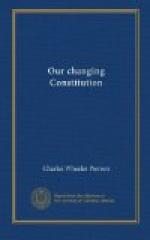It cannot be reiterated too often that, under our political system, legislation in the nature of police regulation (except in so far as it affects commerce or foreign relations) is the province of the states, not of the National Government. This is not merely sound constitutional law; it is good sense as well. Regulations salutary for Scandinavian immigrants of the northwest may not fit the Creoles of Louisiana. In the long run the police power will be exercised most advantageously for all concerned by local authority.
The present tendency toward centralization cannot go on indefinitely. A point must be reached sooner or later when an over-centralized government becomes intolerable and breaks down of its own weight. As an eminent authority has put it: “If we did not have states we should speedily have to create them."[1] The states thus created, however, would not be the same. They would be mere governmental subdivisions, without the independence, the historic background, the traditions, or the sentiment of the present states. These influences, hitherto so potent in our national life, would have been lost.
[Footnote 1: Address of Supreme Court Justice Charles E. Hughes before New York State Bar Association, January 14, 1916.]
In a memorable address delivered in the year 1906 before the Pennsylvania Society in New York, Elihu Root, then Secretary of State in President Roosevelt’s Cabinet, discussed the encroachments of federal power and expressed the view that the only way in which the states could maintain their power and authority was by awakening to a realization of their own duties to the country at large. He said:
The Governmental control which they (the people) deem just and necessary they will have. It may be that such control would better be exercised in particular instances by the governments of the states, but the people will have the control they need either from the states or from the National Government; and if the states fail to furnish it in due measure, sooner or later constructions of the Constitution will be found to vest the power where it will be exercised—in the National Government. The true and only way to preserve state authority is to be found in the awakened conscience of the states, their broadened views and higher standard of responsibility to the general public; in effective legislation by the states, in conformity to the general moral sense of the country; and in the vigorous exercise for the general public good of that state authority which is to be preserved.
Those words, spoken fifteen years ago, were prophetic. Moreover, they are as true to-day as when they were uttered.
Will the people see these things in time? Americans with pride in their country’s past and confidence in her future dare not say No. The awakening may be slow. Currents of popular will are not readily turned. It is hard to make the people think. But if leaders and teachers do their part American intelligence and prudence will assert themselves, and the slogan of an awakened public sentiment may yet be: “Back to the Constitution!”




